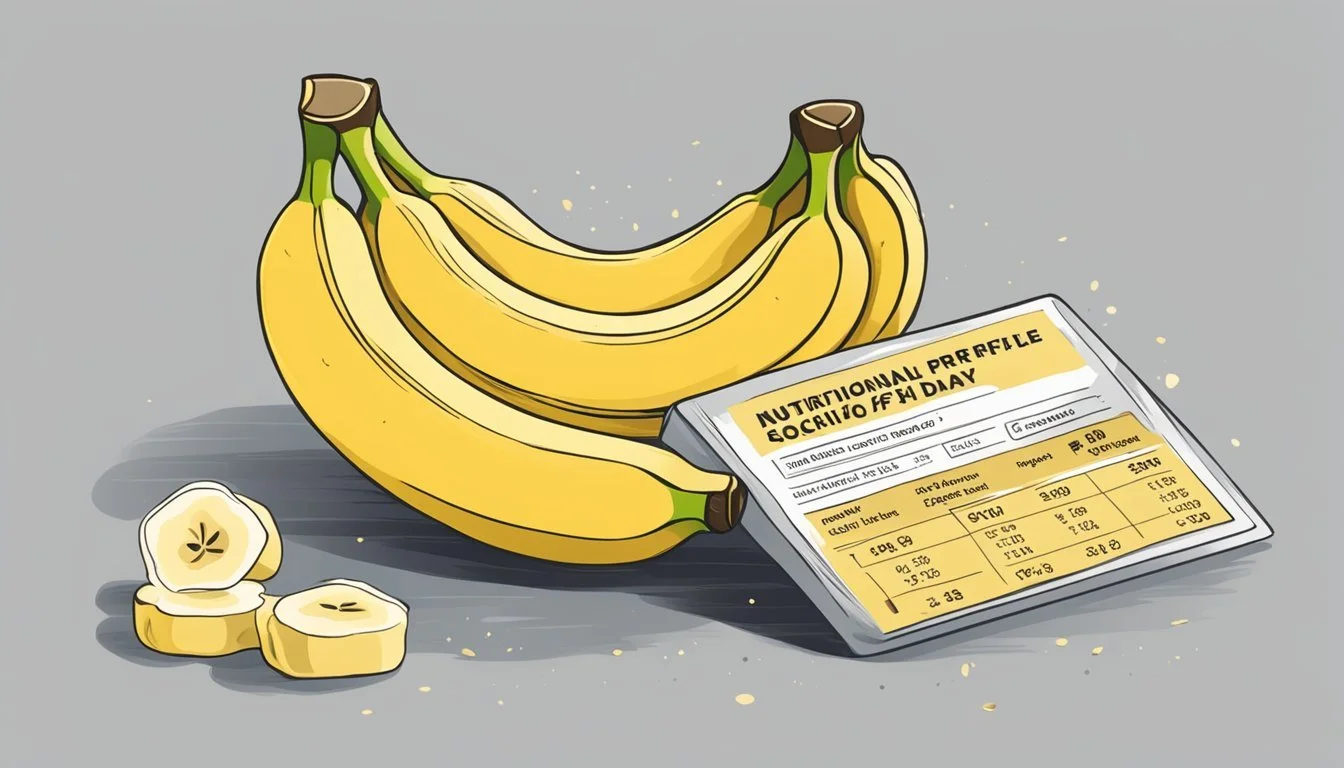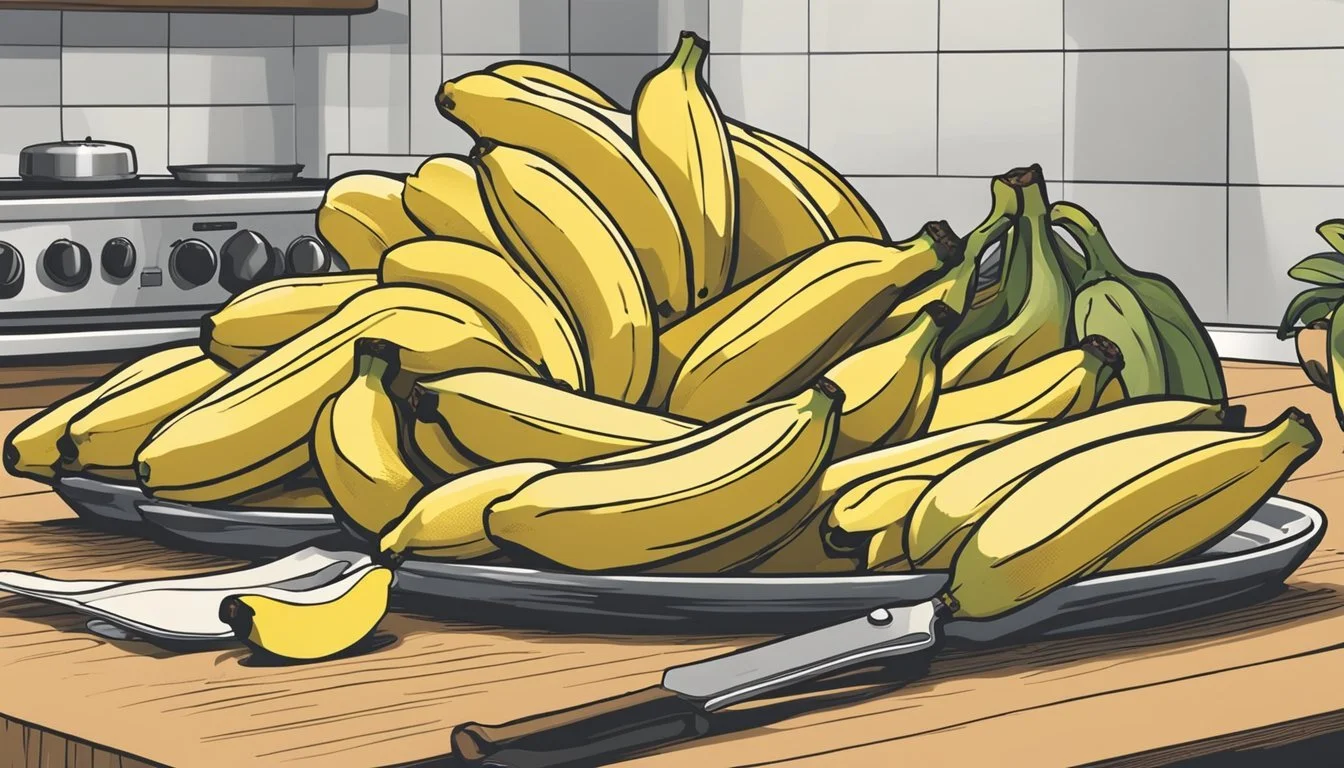How Many Bananas Per Day Is Too Much?
Understanding Safe Consumption Limits
Bananas are a staple in many diets around the world, known for their convenience, natural sweetness, and nutritional profile. Packed with essential vitamins and minerals such as vitamin C, vitamin B6, and notably potassium, bananas offer a range of health benefits. They are linked to improved heart health due to their potassium content, which is crucial for maintaining a healthy blood pressure and heart function. Additionally, bananas provide dietary fiber which is beneficial for digestive health.
While bananas are undoubtedly nutritious, moderation is key to reaping their health benefits without experiencing downsides. Consuming bananas in excessive amounts can lead to an over-intake of potassium, known as hyperkalemia, which can cause health issues in individuals with compromised kidney function. Moreover, because bananas contain carbohydrates in the form of natural sugars, overconsumption could contribute to unanticipated weight gain in certain individuals. It is generally advised that one to two bananas a day are an appropriate quantity for most healthy adults, striking a balance that contributes to a varied and balanced diet.
Nutritional Profile of Bananas
Bananas are a rich source of essential vitamins and minerals, and they have a balanced macronutrient composition, which makes them a convenient and nutritious snack.
Vitamins and Minerals
Bananas contain several vitamins and minerals that are crucial for overall health. They are an excellent source of vitamin B6 and a good source of manganese, vitamin C, and magnesium. Most notably, bananas are very high in potassium, a mineral that is essential for maintaining proper heart function and regulating blood pressure.
Macronutrient Composition
The macronutrient composition of bananas includes carbohydrates, protein, and a small amount of fat. A medium-sized banana (about 100 grams) generally contains:
Protein: 1.1 grams
Total Fat: 0.3 grams
Carbohydrates: 22.8 grams, which are primarily composed of sugars and starches.
Sugar and Fiber Content
Bananas are known for their natural sugars that provide a quick energy boost. They contain approximately 12.2 grams of sugar per 100 grams. However, they also provide a decent amount of dietary fiber—around 2.6 grams—which can aid in digestive health and help moderate blood sugar levels after meals.
Caloric Content
The caloric content of bananas is relatively low, with an average of 89 calories per 100 grams. This makes them a suitable option for those seeking a nutrient-dense snack without a high calorie count.
Health Benefits of Bananas
Bananas are a nutritional powerhouse, providing several health benefits due to their content of vitamins, minerals, and fiber. They are particularly noted for their high levels of vitamin B6, vitamin C, and manganese, as well as contributing to energy metabolism and cardiovascular health.
Digestive Health
Bananas are rich in dietary fiber, with one medium-sized banana containing about 2.6 grams. The fiber in bananas aids in maintaining regular bowel movements and contributes to digestive health. They also contain a type of fiber known as resistant starch, which supports the growth of beneficial gut bacteria.
Energy and Metabolism
Bananas serve as a good source of complex carbs, essential for energy production. Vitamin B6, found in bananas, plays a pivotal role in metabolism, helping to break down proteins and maintain healthy blood sugar levels. Thus, eating bananas can provide a steady source of energy throughout the day.
Cardiovascular Support
The potassium in bananas is integral for heart health. With one medium banana providing approximately 9% of the daily recommended intake of potassium, they can help manage blood pressure and reduce the risk of cardiovascular disease. Potassium aids in balancing the effects of sodium and eases tension in the walls of the blood vessels.
Weight Management
Bananas have a relatively low calorie count and are filling due to their fiber content. This combination can be helpful in weight management, as they can reduce snacking and overeating. Moreover, the fiber in bananas can help slow the absorption of sugar in the bloodstream, potentially preventing sharp spikes in blood sugar.
Daily Banana Intake Recommendations
The appropriate number of bananas a person should consume varies based on individual dietary needs, but general recommendations can guide consumers toward a balanced diet.
General Guidelines
Generally, for most healthy individuals, consuming one to two bananas daily can fit into a balanced diet without contributing to excessive calorie intake. This serving ensures that bananas can be incorporated as a part of the daily recommended servings of fruit. To put this into perspective:
Men are advised to have about 2 cups of fruit a day.
Women between the ages of 19 and 30 should also aim for 2 cups of fruit daily.
Women over 31, however, may require slightly less, with a recommendation of 1.5 cups of fruit a day.
It's important to note that one medium-sized banana is approximately equivalent to 1 cup of fruit.
Considerations for Different Populations
The notion of moderation is key when determining the right amount of any food, including bananas, which varies among different groups:
Active individuals might benefit from higher banana intake due to increased potassium needs.
People who are sedentary should consider limiting their intake to avoid excessive calorie consumption.
Individuals managing conditions that require monitoring of potassium levels, such as kidney disease, need to tailor their banana intake accordingly.
For these populations, integrating bananas into a balanced diet that accounts for all macronutrients and calories is crucial. Personal dietary needs should always be taken into account, and when in doubt, one should consult a healthcare provider or dietitian.
Potential Health Risks
While bananas are a nutritious snack, there are potential health risks associated with eating them in excess. This section will cover the effects of excessive consumption, the impact on blood sugar, and how eating too many bananas might interact with certain medications.
Effects of Excessive Consumption
Excessive consumption of bananas can lead to weight gain due to their calorie content. They also contain significant amounts of sugar which could affect dental health by increasing the risk of tooth decay. High intake may also result in hyperkalemia, a condition characterized by high levels of potassium in the blood, which can be dangerous for those with kidney problems or heart conditions.
Blood Sugar Impact
Bananas have a moderate glycemic index (GI), which measures how much foods raise blood sugar levels. A ripe banana's GI is around 62, and frequent consumption may lead to blood sugar spikes, particularly in individuals with diabetes. Managing banana intake is important to prevent potential episodes of hyperglycemia, where blood sugar levels become too high.
Interactions with Medications
Individuals taking certain medications need to be mindful of their banana intake. For example, beta-blockers, used to treat heart disease, can increase potassium levels in the blood. Adding too many bananas can further elevate this level, resulting in hyperkalemia. Diuretics used in controlling blood pressure can have opposite effects, and careful monitoring of potassium intake is advisable when on these medications.
Bananas in Special Diets
Bananas are a versatile fruit and can seamlessly integrate into various diets due to their nutritional profile, providing energy, essential nutrients, and convenience for those with particular dietary preferences or needs.
Bananas in Plant-Based Diets
In plant-based diets, bananas offer a significant source of essential nutrients that may otherwise be less abundant. They are especially important for vegans who exclude all animal-derived products. Bananas provide a quick and easy source of carbohydrates and natural sugars, crucial for instant energy boosts. They are also rich in vitamins and minerals such as vitamin B6, potassium, and manganese, making them a nutritious snack or an ingredient in meals. Although bananas are not a high-protein food, they can complement other protein sources in a vegan diet, such as legumes and nuts.
Nutrient Contribution in Vegan Diets:
Carbohydrates: Approx. 23g per medium-sized banana
Vitamin B6: About 20% of the Recommended Daily Allowance (RDA)
Potassium: 422mg, which is about 9% of RDA
Plant-based diet-friendly banana uses:
Smoothies with added vegan protein powder
Banana bread using flaxseed as an egg substitute
Sliced bananas topped with nut butter
Role in Sports Nutrition
For athletes or individuals engaging in regular workouts, bananas can play a critical role in sports nutrition. They are a natural and wholesome source of carbohydrates, which are vital for muscle function and recovery. The presence of potassium aids in regulating muscle contractions and preventing cramps. Furthermore, bananas are easy to digest and thus can serve as a pre or post-workout snack to replenish glycogen stores and provide a burst of energy.
Sports Nutrition Facts:
Carbohydrates for glycogen replenishment
Potassium for electrolyte balance
Easily digestible source of energy before and after exercise
Workout-friendly banana applications:
Pre-workout: A banana about 30 minutes before exercising for an energy kick
Post-workout: A banana with a source of protein to aid in muscle recovery
Incorporating bananas into special diets requires considering individual dietary goals and nutritional needs, but their adaptability and health benefits make them a valuable fruit in various eating patterns.
Consuming Bananas: Best Practices
When it comes to consuming bananas, moderation and variety are key. It is generally recommended to limit intake to one to two bananas per day to avoid excessive calorie and sugar consumption.
Optimal Ripeness
The stage of ripeness affects a banana's nutrients and sugar content. Green bananas are higher in resistant starch, which may aid in digestion. Ripe bananas have more antioxidants but also higher sugar levels, making them a quick energy source. Overripe bananas, spotted with brown, are very high in sugar and may be best used in baking, as they are softer and sweeter.
Pairings and Combinations
To maintain balanced nutrition, pair bananas with foods high in healthy fats and protein. For example, adding peanut butter or nuts provides protein and fats that can help slow sugar absorption. Yogurt is an excellent pairing as well, combining the probiotic benefits with the fiber of the banana.
Ideal Pairings:
Banana + Peanut Butter
Banana + Mixed Nuts
Banana + Yogurt
Incorporation into Meals
Bananas can be creatively incorporated into various meals. For breakfast, they can be sliced into oatmeal or cereal. Recipes for banana pancakes or muffins can use ripe to overripe bananas for natural sweetness and moisture. Salads and smoothies benefit from the addition of sliced green or ripe bananas for a nutritious boost.
Meal Ideas:
Oatmeal topped with banana slices
Banana pancakes with nuts
Smoothies with banana and yogurt
Understanding Banana Varieties
When exploring banana consumption, it's essential to consider the various types available and their nutritional profiles. Different cultivars exist, and these can vary significantly in terms of carbohydrate content, levels of starch and resistant starch, and sugar content, including fructose.
Common Cultivars
Bananas come in numerous cultivars, each with its distinct characteristics. The most widely consumed banana is the Cavendish, which is the standard type found in grocery stores. Other common cultivars include the Lady Finger, Red Banana, and Plantain, which is starchier and often used in cooked dishes. The Manzano or "Apple Banana" is smaller and sweeter, while the Burro Banana has a square shape and a lemony flavor.
Nutritional Differences
The nutritional composition of bananas can differ among cultivars, especially in terms of:
Carbohydrates: Essential for energy, the carb content varies with ripeness; green bananas have more starch, while yellow ones have higher sugar levels.
Starch/Resistant Starch: Unripe bananas contain higher amounts of resistant starch, which does not digest and aids in blood sugar management and satiety.
Sugar Content: As bananas ripen, starch converts to sugars such as fructose, glucose, and sucrose, increasing their overall sweetness.
These differences impact not only the taste and texture of the bananas but also their suitability for different dietary needs.
Culinary and Alternative Uses of Bananas
Bananas not only serve as a healthy snack but also as a versatile ingredient in cooking and baking. They have unique properties that make them suitable for a variety of non-dietary applications as well.
Cooking and Baking
In the realm of cooking and baking, bananas provide moisture and natural sweetness, reducing the need for added sugars and fats. They are commonly mashed and incorporated into banana bread, a classic recipe that often counts as one of the daily recommended servings of fruit. Bananas also contribute to the creamy texture in smoothies, and they can be a critical component for various desserts and breakfast dishes.
Popular Recipes:
Banana Bread
Banana Pancakes
Banana Muffins
Bananas can be sliced and added to cereals or oatmeal, offered as a nutritious topping. Chefs use them as a sweet contrast in savory dishes, such as banana curry or banana-stuffed chicken.
Non-Dietary Uses
Aside from their culinary uses, bananas have several non-dietary applications. The peel contains nutrients and oils that have been utilized in alternative contexts. They can shine shoes, nourish plant leaves, and even polish silverware when used as a rubbing material.
Examples of Non-Dietary Uses:
Shoe polish: Rubbing a banana peel on leather shoes can create a natural shine.
Plant nourishment: Banana peels can be buried near the roots of plants as a natural fertilizer.
When considering bananas for their multipurpose use, they are a resourceful fruit both in and out of the kitchen.









